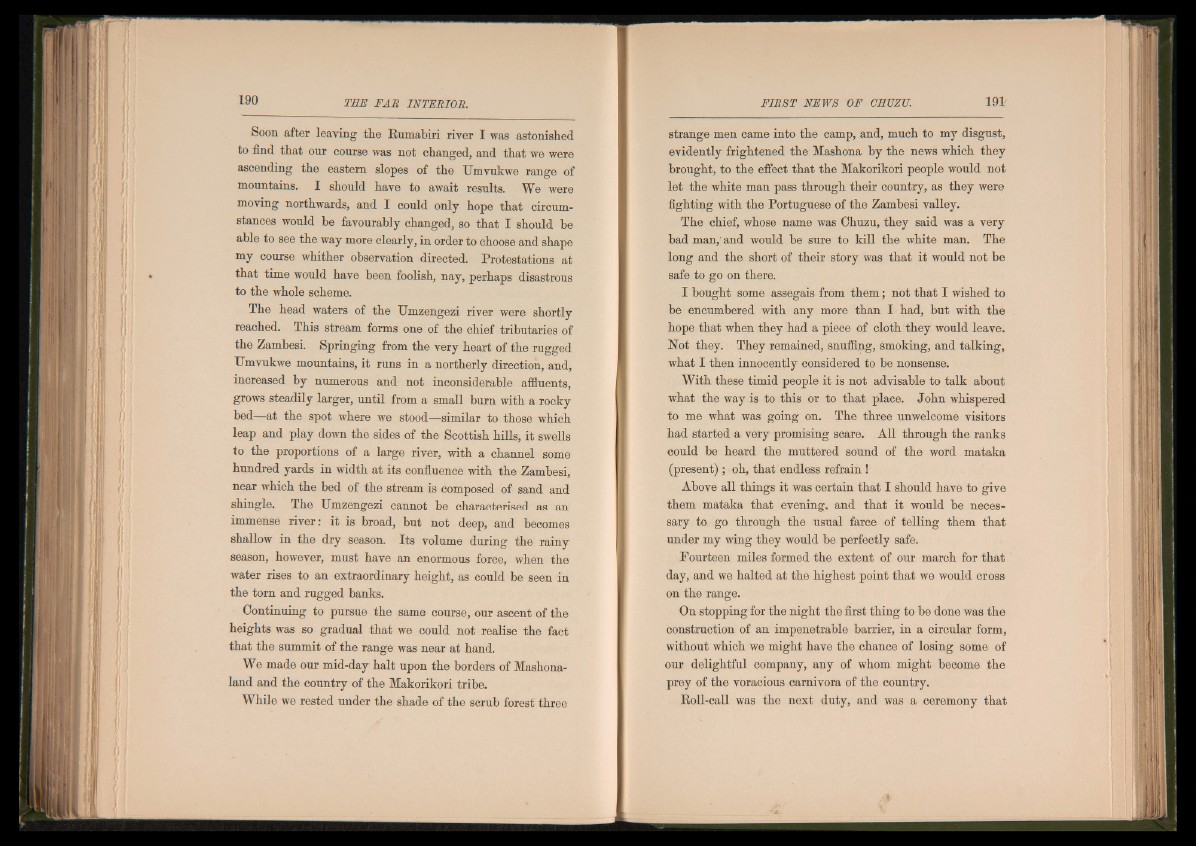
Soon after leaving the Kumabiri river I was astonished
to find that our course was not changed, and that we were
ascending the eastern slopes of the Umvukwe range of
mountains. I should have to await results. We were
moving northwards, and I could only hope that circumstances
would be favourably changed, so that I should be
able to see the way more clearly, in order to choose and shape
my course whither observation directed. Protestations at
that time would have been foolish, nay, perhaps disastrous
to the whole scheme.
The head waters of the Umzengezi river were shortly
reached. This stream forms one of the chief tributaries of
the Zambesi. Springing from the very heart of the rugged
TJmvukwe mountains, it runs in a northerly direction, and,
increased by numerous and not inconsiderable affluents,
grows steadily larger, until from a small burn with a rocky
hed—at the spot where we stood—similar to those which
leap and play down the sides of the Scottish hills, it swells
to the proportions of a large river, with a channel some
hundred yards in width at its confluence with the Zambesi,
near which the bed of the stream is composed of sand and
shingle. The Umzengezi cannot be characterised as an
immense river: it is broad, but not deep, and becomes
shallow in the dry season. Its volume during the rainy
season, however, must have an enormous force, when the
water rises to an extraordinary height, as could be seen in
the tom and rugged banks.
Continuing to pursue the same course, our ascent of the
heights was so gradual that we could not realise the fact
that the summit of the range was near at hand.
We made our mid-day halt upon the borders of Mashona-
land and the country of the Makorikori tribe.
While we rested under the shade of the scrub forest three
strange men came into the camp, and, much to my disgust,
evidently frightened the Mashona by the news which they
brought, to the effect that the Makorikori people would not
let the white man pass through their country, as they were
fighting with the Portuguese of the Zambesi valley.
The chief, whose name was Chuzu, they said was a very
bad man,' and would be sure to kill the white man. The
long and the short of their story was that it would not be
safe to go on there.
I bought some assegais from them; not that I wished to
be encumbered with any more than I had, but with the
hope that when they had a piece of cloth they would leave.
Not they. They remained, snuffing, smoking, and talking,
what I then innocently considered to be nonsense.
With these timid people it is not advisable to talk about
what the way is to this or to that place. John whispered
to me what was going on. The three unwelcome visitors
had started a very promising scare. All through the ranks
could be heard the muttered sound of the word mataka
(present) ; oh, that endless refrain !
Above all things it was certain that I should have to give
them mataka that evening, and that it would be necessary
to go through the usual farce of telling them that
under my wing they would be perfectly safe.
Fourteen miles formed the extent of our march for that
day, and we halted at the highest point that we would cross
on the range.
On stopping for the night the first thing to be done was the
construction of an impenetrable barrier, in a circular form,
without which we might have the chance of losing some of
our delightful company, any of whom might become the
prey of the voracious carnivora of the country.
Boll-call was the next duty, and was a ceremony that